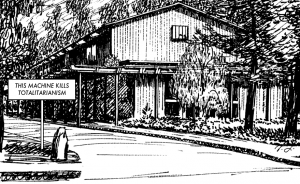Today’s classical music video is of the Bang on a Can All-stars rocking out on Steve Reich’s “2×5” (2008). Steve Reich (b. 1936) started out as a jazz drummer, but soon switched to composing lcassical music. He is best known for his early minimalist compositions. Bang on a Can is a group of composers and musicians who have produced some remarkable performances and compositions in the twenty-five years since they were organized. If you have a chance to attend their 12 hour Bang on a Can Marathon, held each summer in North Adams at Mass MOCA, go — it will change your image of “classical” music forever.
Alas, the videography is boring. On the other hand, it’s fun watching the interaction of the musicians without constant intrusions from the videographer.
By the way, this video proves something I had though impossible: you can have a group of four electric guitar players in which not one is an egomaniac. There are four electric guitars, and two bass guitars, in this video, and every guitarist is an extremely disciplined musician showing very little ego in a very tight band.

